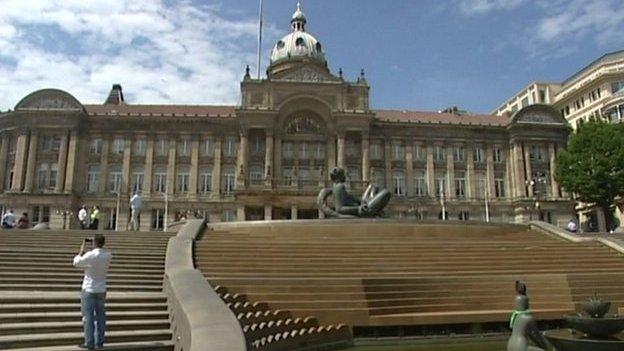Men in Birmingham 'exploitation' order named
- Published

Birmingham City Council had launched civil court proceedings against 10 men, a High Court judge had been told
Six men banned from contact with young girls after a council became the first to use civil injunctions to block child sexual exploitation can be named, a High Court judge has said.
Mr Justice Keehan said the names of Mohammed Anjam, 31, Omar Ahmed, 27, and Mohammed Javed, 34, could be revealed.
Alam Shah, 37, Sajid Hussain, 40, and Naseem Khan, 29, can also be named.
An injunction against a seventh man, who cannot be named for legal reasons, was also granted.
Police had raised concerns about the men's safety if they were identified.
'Vulnerable 17 year old'
After the hearing, Det Ch Supt Danny Long, head of West Midlands Police's public protection unit, said photographs of the men would not be made public.
"We are duty bound to act proportionately to the threat the men currently pose to the girl and possibly others," he said.
"We also have a duty to consider the impact of releasing the men's images on innocent family members."
The judge had granted long-term injunctions against two of the men earlier this week.
The injunctions came after social workers at Birmingham City Council and police raised concerns about the welfare of a vulnerable 17-year-old girl who is in the care of the council.
The judge barred the men from approaching the girl until she turned 18 following a public hearing in the Family Division of the High Court in London.
Mr Justice Keehan said the name of Omar Ahmed, 27, could be revealed - Sian Lloyd reports
He also barred them from approaching "any female under 18", with whom they were not personally associated.
Lorna Meyer QC, for Birmingham City Council, said the authority and police had identified a "number of individuals" found to be "inappropriately" in the company of the 17-year-old girl.
Lawyers thought there was not enough evidence to secure criminal convictions - on a beyond reasonable doubt basis - "at the current time".
But they thought there was enough evidence to obtain civil court injunctions - on a balance of probabilities basis.
Contempt of court
Orders were made against Mr Khan, of Bordesley Green, Mr Javed, of Tyseley, and Mr Alam, from Small Heath at the hearing.
Mr Justice Keehan made orders against Mr Anjam, of Aston, and Ahmed, from Yardley, on Monday.
An order had been made against Mr Hussain, of Warwick Road, Birmingham, at an earlier hearing.
The local authority had launched civil court proceedings against 10 men.
Miss Meyer said if long-term injunctions were made, and any of the men were found "in the company of a vulnerable child" by West Midlands Police or Birmingham City Council in breach of the orders, then lawyers would ask a judge to impose jail terms for contempt of court.

Analysis: Michael Buchanan, BBC News
This is undoubtedly a creative way to try to protect children from a council whose recent history is littered with child protection failures.
Unable to gather enough evidence to pursue criminal charges, but desperate to protect vulnerable children, councils have often sought to place the child in secure accommodation. That is often seen as punishing the victim as they are taken away from their own community having already been sexually exploited.
Seeking injunctions through the civil courts, where the burden of proof is lower than in criminal trials, has therefore allowed Birmingham to put the men on the back foot.
But if any of the men are attacked, or their identification leads to community tensions - both fears were expressed by the police in court - then the rationale behind what is currently seen as an innovative legal approach, and one that is being eagerly watched by other councils, could lead to some serious questions for Birmingham City Council.

Mr Justice Keehan heard arguments about the publication of names from police, some of the men and journalists.
The judge ruled the media should be allowed to identify men who were the subject of full and final injunctions.
The council said the girl had been reported missing from care 102 times since July 2010 and it believed she had been "consistently sexually exploited".
Head of anti-sexual abuse programmes at children's charity the NSPCC, John Brown, said the council's actions were a "brave step" but accepted the case may prove controversial.
"Any measured effort to stop the foul activities of those seeking to exploit vulnerable children is to be welcomed," he said.
'Ground-breaking' move
Peter Hay, strategic director of people at Birmingham City Council, said: "We're still a council with our struggles with safeguarding children. That's well known.
"The importance and ground-breaking nature of what we've done here is that for the first time those that are sexually exploiting children cannot rely on their silence.
"We can find other ways of bringing it... to attention and dealing with the men concerned than just the child who has all those vulnerabilities whose silence has been bought in by other things such as drink or alcohol."
Det Ch Supt Long said: "We will monitor compliance with the injunctions... This is a test case, this is something that is being watched across the country with regards how we get on.
"This is not a soft option. Where we have the evidence we will always go down the criminal route, we will look to arrest and to put people in front of a court."
There were 75 live criminal investigations at the moment into child exploitation in the West Midlands and a further 210 cases were being looked into, authorities said.
The hearing is to conclude on Thursday.
- Published18 November 2014
